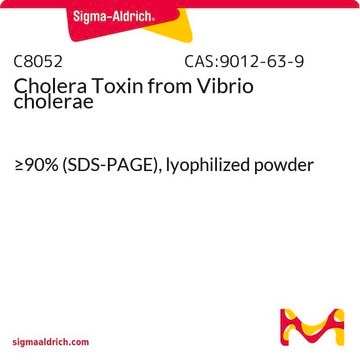T8931
Thyrotropic hormone from bovine pituitary
Synonym(s):
TSH, Thyroid stimulating hormone, Thyrotropin from bovine pituitary glands
About This Item
Recommended Products
biological source
bovine pituitary glands
form
powder
packaging
vial of 100 μg
technique(s)
cell culture | mammalian: suitable
storage temp.
2-8°C
Gene Information
cow ... TSHB(281552)
human ... TSHR(7253)
Looking for similar products? Visit Product Comparison Guide
General description
Application
- to induce cAMP production in orbital fibroblasts.
- as a component in Dulbecco modified eagle medium (DME) H-21:F-12 media.
- for TSH stimulation test for assessing the thyroid gland function after nonthyroidal illness (NTI) induction.
- for studying the thyrotropin involvement in photoperiodic signal transduction in mice.
Biochem/physiol Actions
Quality
Storage Class Code
11 - Combustible Solids
WGK
WGK 3
Flash Point(F)
Not applicable
Flash Point(C)
Not applicable
Regulatory Listings
Regulatory Listings are mainly provided for chemical products. Only limited information can be provided here for non-chemical products. No entry means none of the components are listed. It is the user’s obligation to ensure the safe and legal use of the product.
JAN Code
T8931-10VL:
T8931-VAR:
T8931-1VL:
T8931-BULK:
Certificates of Analysis (COA)
Search for Certificates of Analysis (COA) by entering the products Lot/Batch Number. Lot and Batch Numbers can be found on a product’s label following the words ‘Lot’ or ‘Batch’.
Already Own This Product?
Find documentation for the products that you have recently purchased in the Document Library.
Our team of scientists has experience in all areas of research including Life Science, Material Science, Chemical Synthesis, Chromatography, Analytical and many others.
Contact Technical Service






